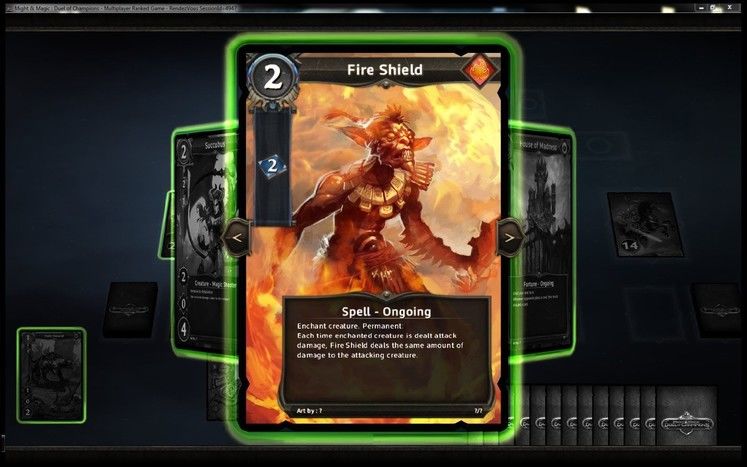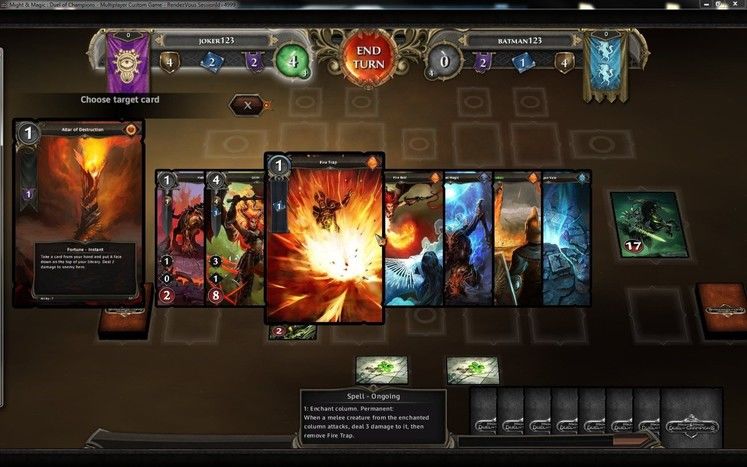The first thing of note is that if you have played Hearthstone, you will essentially grasp Duel of Champions in a matter of moments. The UI is a little busier and the faux table where you'll lay out your cards looks more complicated than Blizzard's crowd pleaser. But what we have here is two games that share many rules in common. Each turn you have a resource point limit that determines how many cards you can play, with cards of higher power costing more. Each turn you gain 1 resource point, meaning that each game begins with weak cards and disposable minions being sent out, while a long-lasting duel sees cards of power and potency being played as the game stretches on. Despite that, games are not particularly long in length, unless you come up against a particularly ponderous opponent.
 |
| Spell cards can have a wide array of effects - from shielding your units with shroud of flame, to infecting foes with a crippling plague |
So far, so familiar, but Duel of Champions has a few tweaks to the CCG formula that serve to add layers of tactical depth. Each card as well as requiring action points to play needs you to have the requisite number of Might, Magic or Destiny points, one of which can be increased by your hero each turn. If you have a deck stacked with potent spells, perhaps it will be in your interest to focus on increasing Magic points, or if you have a Fortune card that is central to your strategy, it's a good idea to ensure you're able to play it upon reaching your hand. If you have a weak hand or meet all the prerequisites for your cards ,you can simply draw another card instead, at the cost of one resource point.
You deck is primarily built up from Creature, Spell and Fortune cards, with each doing as you'd expect. Creatures are the minion's you'll place on the board, with the aim of taking down the opposing hero (also a key component of your deck) and doing damage to your opponents forces. Spells are extremely varied modifiers, from a lightly buffing your own units, cursing your opponents, or dealing damage or healing based on how the game plays out. Spell cards and the use thereof are what separates the good players from the rest, with clever spell use crippling an enemies army or hero, while ensuring that your own units go down while putting up a pretty darn good fight. Fortune cards are mostly there for utility, allowing you to draw extra cards or have more resources at your disposal.
Duel of Champions is at its core a well designed CCG, with clever interplay between the different card types, while each of the starter decks have a unique focus that changes the way they play. For instance the Necropolis deck has a focus on creatures that can cripple or infect opponents, along with powerful units able to sustain themselves in battle through using life-steal. There are currently 6 factions available to play and you're able to select a deck right at the end of the tutorial which best suits your play-style. On release you were limited to the selection of two of four factions, so it's clear just how far the game has expanded since then - instead of boxing new players into something labelled for 'beginners', you can simply jump in at the deep end and pick out the faction that appeals to you most.
 |
| Creating a deck to end all decks and wreaking havoc with custom strategies is the goal in all CCGs |
Being a free-to-play game suits CCGs very well. As anyone aficionados of Magic The Gathering will know, 'pay to win' doesn't have the same stigma in that world as it does when it comes to gaming. If you want to build a deck beyond the basic cards there, you need to trade or buy more cards. The same rules basically apply here - you can earn (or grind for) in-game currency by running through the single-player campaigns, or by taking on real opponents in ranked duels. Alternatively you can opt to expedite that process by paying for 'seals' to spend in the in-game store. £30 will net you around 24 packs, each containing 12 cards. It sounds expensive, but CCG's have always been something of an expensive hobby, Duel of Champions gives you plenty of roads to reach mastery, but those who are willing to spend some money will certainly have an advantage, particularly at lower levels of the game.
MIGHT & MAGIC DUEL OF CHAMPIONS VERDICT
If you want to get the most out of Duel of Champions, you will probably need to spend some money, to ensure that your deck or decks are rounded out with top-tier cards. If you’re unwilling to do so, you’ll likely suffer at the hands of players who have and face a long grind as you attempt to complete your deck. CCG’s have always been about getting more cards and formulating strategies to get an edge on your opposition, which is why they feel particularly well suited to free-to-play implementation that might otherwise be dismissed as ‘pay to win’. The fact is though, Duel of Champions is an excellent CCG that more than matches other available titles in terms of strategic depth and deck-building. Its UI is clean and uncluttered and while it does suffer a little in comparison to Blizzard’s masterfully user-friendly Hearthstone, ultimately that doesn’t count against it too much as a long-term experience.
TOP GAME MOMENT
Opening a pack of new cards to see what treasures lie within.




